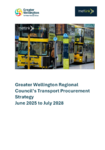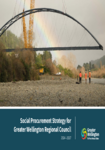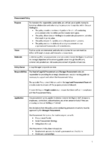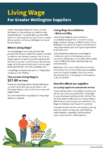Doing business with us
On this page you will find information on how GW procures. We want businesses to be ready for opportunities to work with us as a supplier.
Greater Wellington has a number of strategies and policies that set out how we buy things, what things we will need to buy in the future, and how we expect suppliers to work with us.
Transport Procurement Strategy 2025 - 2028
Outlines the public transport procurements that are planned to happen in the next three years. This programme of work is subject to change. It is co-funded by New Zealand Transport Authority Waka Kotahi
Greater Wellington Regional Council’s Transport Procurement Strategy - June 2025 to July 2028


date_range Published 24 Jul 2025
Download now (PDF 848 KB) get_appSocial Procurement Strategy 2024 - 2027
A guiding document that supports all Greater Wellington to fully consider and appreciate the positive social, environmental, cultural and economic outcomes of a purchasing decision in addition to the thing we are buying.
It sets out change activity for procurement processes, Priority Impact Areas for procurement and what we will require of suppliers in future. It also sets out 10 year spend targets for supplier diversity
Social Procurement Strategy for Greater Wellington Regional Council 2024 -2027


date_range Published 24 Jul 2025
Download now (PDF 7 MB) get_appProcurement Policy
Sets out the policies for Greater Wellington officers when they are procuring to ensure we uphold obligations as a local authority to run fair, transparent and robust procurement processes that deliver public value.
Procurement Policy


date_range Published 24 Jul 2025
Download now (PDF 363 KB) get_appSupplier Code of Conduct
Greater Wellington requires all suppliers and subcontractors to comply with the New Zealand Government Supplier Code of Conduct. We may ask a supplier at any time to provide evidence of compliance. Suppliers can use a range of evidence to demonstrate they’re meeting expectations. This can include policies, practices, certifications, and accreditations.
Some of the most common ways Greater Wellington procures goods and services.
Direct appointment
Used for low value and low risk procurements. Direct Appointment means that Greater Wellington chooses an appropriate supplier and awards a contract/Purchase Order directly to them.
Competitive process
A competitive process is where Greater Wellington will seek quotes/proposals/tenders from multiple suppliers. There are two types:
Closed competitive: quotes/proposals/tenders are sought from a small number of suppliers identified via market research.
Open competitive: quotes/proposals/tenders are released publicly to the wider supplier market, any supplier can respond. This release happens via GETS.
Panels
A Panel is a group or pool of suppliers who have been through a process, usually an open competitive process, to prequalify them to provide services or goods that are within a defined scope. Once a panel is set up only the suppliers on the panel are used for the services the panel covers.
Greater Wellington officers then procure services from the panel of suppliers rather than needing to go to the market every time. An example of a Greater Wellington panel is the Restoration Services Panel where we procure from prequalified nurseries and planting care suppliers.
Living Wage information for Suppliers
Greater Wellington is an accredited Living Wage Employer. Accreditation is a programme run by Living Wage Aotearoa who also set and advocate the New Zealand Living Wage.
This means we require suppliers to pay at least the Living Wage to employees working on any Greater Wellington contracts.
Greater Wellington definitions for which contracts or roles must be paid Living Wage are:
In Scope for us means contracted services delivered where the service is the responsibility of Greater Wellington and delivered on behalf of Greater Wellington by Dedicated Employees.
For example: cleaning in parks, planting and post care, pest trapping, public transport operations, bird surveying.
Dedicated Employees means any employee of a contracted or subcontracted party, working on the services to be delivered. For the purposes of this definition, a person, business, company or organisation is not considered a contracted or subcontracted party if they are self-employed or otherwise considered an independent contractor.
There are some exceptions:
- Sole traders/independent contractors
- Funding agreements, community grants and scholarships
- Services delivered outside of NZ
- All of Government contracts that Greater Wellington is a party to
- Employees who are not dedicated to delivering Greater Wellington services (e.g. a cleaner that works for our supplier but doesn’t clean any Greater Wellington sites)
- Goods only contracts including delivery of those goods to site.
- Trainees who are working towards an NZQA qualification for the purposes of doing their job. They may be paid 90% of the Living Wage during their training if they meet certain criteria.
Suppliers are not required to already be paying Living Wage to be considered for contracts. We will ask you to commit to paying Living Wage for the contract when going through the tender process or when signing a contract. Download the guidance for Suppliers for more information.
Living Wage For Greater Wellington Suppliers


date_range Published 24 Jul 2025
Download now (PDF 152 KB) get_appWhere we advertise opportunities
- Greater Wellington posts new opportunities, where competitive market approach is the best option, on the GETS website.
- In some cases, depending on the location or nature of the opportunity, we also advertise in local papers, with business networks, and on our social media pages.
What is GETS?
- GETS stands for ‘Government Electronic Tenders Service’.
- Greater Wellington uses GETS to advertise open contract opportunities (‘tenders’) to the supplier market.
- The GETS platform is managed by the Ministry of Business, Innovation, and Employment (MBIE), and is used by both central and local government organisations.
- GETS is free – it does not cost suppliers anything to register.
Why should I register as a Supplier on GETS?
Suppliers who are registered on GETS can:
- Receive notifications for Greater Wellington contract opportunities that align with your chosen categories of interest.
- View general information about those contract opportunities.
- Subscribe to opportunities, which allows you to download tender documents, ask questions, receive updates, and submit responses.
For contract opportunities advertised via GETS, Greater Wellington will only receive responses via the GETS platform.
How to register on GETS
- To register on GETS, you will need a RealMe Login. Click here to create one, if you don’t have one already.
- Once you have a RealMe Login, head to www.gets.govt.nz and click on the red ‘Supplier log in’ button in the top right-hand corner.
- Once you have entered your RealMe username and password and logged in to GETS, you will be able to create your GETS supplier account – this will include a verification step for your email address.
- Once you have a supplier account, you will be able to update your preferences including which categories you are interested in receiving notifications for.
For more help:
The GETS website contains help for suppliers, including more detailed information about how to register and use the GETS platform.
More support
Greater Wellington does not currently have a programme to support businesses to be bid ready, but there are lots of great organisations who do!
Te Matarau a Māui are our regional partner for Māori economic development and can support businesses to be ready for government procurement opportunities.
WellingtonNZ provides capability vouchers to access business coaching and courses for a discounted price from hundreds of providers through the Regional Business Partner Network.
Business.govt.nz has a lot of practical and relevant resources and case studies from how to start or grow your business to how to create an invoice.
Our standard contracting terms
Read Greater Wellington’s standard terms and conditions.
This includes:
- Purchase Order Terms and Conditions
- Government Model Contract (GMC) Terms and Conditions
Depending on the types of services/goods/works being delivered, other contract types and terms may apply.
Invoicing
To be paid for your work with Greater Wellington you will need to send us an invoice.
Some tips to make sure you are paid on time.
- You will receive a form from your Greater Wellington contact to provide information that sets you up in our financial system. Fill this out accurately. You will need to provide proof of your bank account details.
- You should receive a purchase order. If not, speak with your Greater Wellington contact.
- Review the purchase order to ensure the description of the items or services that were ordered matches what you have put on your invoice exactly.
- Put the purchase order number on your invoice before submitting it to us.
- If your business is GST registered your invoice must include your GST number and state that it is a tax invoice.
- Submit a complete and accurate invoice.
- Our standard payment terms are the 20th of the month following the date of the invoice. For small businesses, we aim to pay closer to the date of the invoice and sending us your complete invoice on time helps with this.
General guidance on invoices including a template can be found on business.govt.nz.
If you have delivered your goods or services, submitted an invoice as above and not yet been paid check with your Greater Wellington contact or contract manager as the first step.
Get in touch
- Phone:
- 0800496734
- Email:
- info@gw.govt.nz
